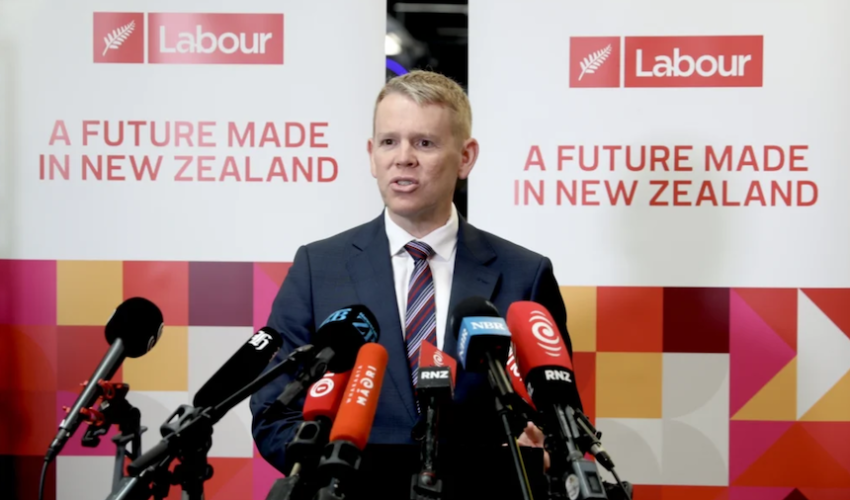Learn » Blog » Making sense of Labour's Future Fund
Making sense of Labour's Future Fund
Published on 27/10/2025

By Sam Stubbs. This article was originally written for The Post.
The first economic policy of the Labour Party, the Future Fund, is both unsurprising and curious. It is unsurprising because the basic idea of using profits from government-owned entities to fund economic growth, in a separately managed fund, is not unusual globally. There are variations of this around the world, including the very successful one that the Labour Party refers to, Temasek in Singapore. But it is also curious, because, as the first economic policy from the opposition, it seems to change little of significance.
A great idea, in principle
The principle of the Future Fund is a sensible one. To pay for the schools and hospitals we want, we need to grow. And to grow, we need to invest. Labour has a solid track record here, with past Labour-led Governments creating KiwiSaver, the NZ Super Fund and the ACC, all retained by successive National Governments. The last Labour Government also created the Elevate NZ Venture Fund, with $300 million to invest. National added another $100 million to it last year. But with its recently announced Future Fund, the devil is in the details, and there are very few of those.
The first big unknown is which State Owned Enterprises (SOEs) will be put into the Future Fund. SOEs are a mixed bunch, shaped by history and necessity. The Government owns majority stakes in three of our four biggest power companies, as well as Transpower, Air New Zealand, NZ Post, Kordia, KiwiBank, Landcorp, Airways Corporation and Quotebale Value (QV). Collectively, these companies paid approximately $800 million in dividends to the Government last year.
The second unknown is how to spend the profits the SOEs would provide to the Future Fund. Areas like Venture Capital (VC) already have plenty of investors in New Zealand. So, how a Labour-led government would invest their available funds is critical to the benefit taxpayers get. Infrastructure seems like a natural fit to me, but who knows what their priorities at the time will be.
The third big question is: if the Gentailers are included in the Future Fund, will they will be allowed to raise capital to invest in further power generation? This would require the Government to either dilute its 51% holding in these companies, or provide its part of the investment required from tax dollars. Either way, it's a sensitive political issue. National has been clear that they will stump up any additional investment required to keep their 51% stake of the Gentailers in such a situation. Labour has not yet specified their approach.
How the fund operates is important
But one big question has already been answered i.e., who will manage the fund. The New Zealand Super Fund has an excellent track record in investing and is a good choice for that. But as manager of the fund that owns the SOEs, would it have a say over SOE management and strategy? That is not its core competency, so may not be the right approach.
To my mind, the creation of the Future Fund needs to be seen in the context of a raft of economic policies yet to be announced by the Labour party. In isolation, it looks like an orphan, denying the future Government money to spend on schools and hospitals so it can all be reinvested for growth. That would mean taxes or borrowing would need to rise to make up for the lost revenue for infrastructure, kind of like robbing Peter to pay Paul. But if Labour fills that funding gap with a Capital Gains or Wealth tax (obviously a controversial subject), the Future Fund starts to look more like a part of an integrated financial policy platform.
There's potential here, based on past experience
I am not yet passing any judgment on whether the Future Fund is a good idea, based on the limited information presented. There are a myriad of management and governance questions that have yet to be answered. But Labour does seem to have a very good track record of creating enduring and successful investment institutions like the Cullen Fund, KiwiSaver and the ACC. So let's see if they can do it again.
To my mind, this announcement really tells us two things.The first is that the major political parties are now admitting they cannot fund the infrastructure we need via taxes alone. There are simply too many demands on our tax dollars, including fast-growing superannuation, health and debt servicing costs.
The second is that Labour will not cross the Rubicon of selling any stake, in any SOE, to anyone. It is a line the party faithful will not cross, and it’s understandable in the context of selling the crown jewels to foreigners. But it risks being a head-in-the-sand ideology in terms of the KiwiSaver world. KiwiSaver funds are now over $130 billion, and growing. But they are struggling to find any meaningful infrastructure investments in New Zealand, and are investing more and more overseas instead.
The numbers speak for themselves
When I started managing KiwiSaver funds 14 years ago, managers invested an average of 40% of their KiwiSaver funds under management in New Zealand. But it is now 30%, and falling. In contrast, Australian Superannuation funds have approximately 50% of funds under management invested locally.
Overseas investment diversifies investments and generates returns, so it is not a bad thing per se. But it creates no jobs in New Zealand. If KiwiSaver funds could invest more in SOEs, or invest alongside them, KiwiSaver members would get good returns, and our kids would have more job opportunities. There is nothing wrong with selling the family jewels, as long as it's to the family.
The good, the bad, and the unanswered questions
The Future Fund announcement feels to me like the first part of a plan to start another institution in New Zealand, along the lines of the Cullen Fund or the ACC. Details are thin, but they have a track record of doing these things well. But there will have to be tax rises or spending cuts to make up for the SOE profits that would stay in the Future Fund. So expect this announcement to be a part of an economic policy that includes rising taxes or spending cuts. Otherwise, the numbers just don't add up.
That Labour wants to set up the Future Fund is unsurprising. And it’s curious also, because it skips a golden opportunity to allow KiwiSaver - which Labour created - to invest in SOEs, create jobs, and keep taxes lower. Is that a future we should all want?
The information provided and opinions expressed in this post are intended for general guidance only and not personalised to you. These materials do not take into account your particular financial situation or goals and are not financial advice or a recommendation. This post is not intended to convey any guarantees as to the future performance of any of the investment products, asset classes, or capital markets mentioned. Past performance is no guarantee of future performance. Information is current at the time of posting, and subject to change without notice. Simplicity NZ Ltd is the issuer of the Simplicity KiwiSaver Scheme and Investment Funds. For Product Disclosure Statements please visit our website simplicity.kiwi.


